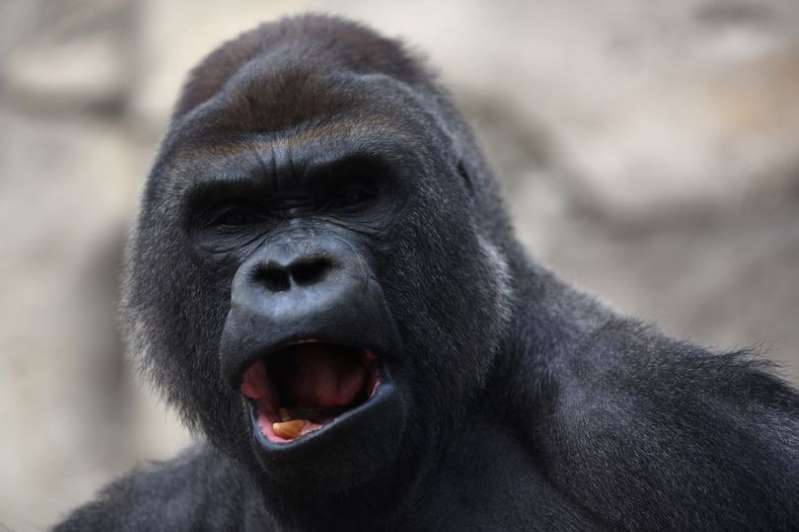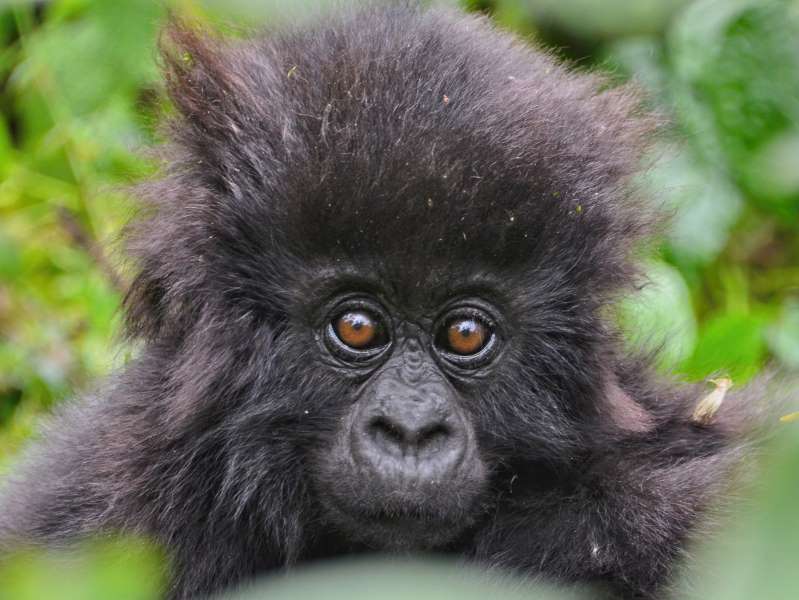Madrid zookeeper seriously injured after being attacked by 200kg gorilla






Madrid zookeeper seriously injured after being attacked by 200kg gorilla
An animal keeper has been seriously injured at the Madrid Zoo after being attacked by a gorilla.
The 46-year-old woman reportedly suffered a head injury, chest trauma with multiple fractures and and two broken arms this morning.
She was stabilised at the scene before being rushed to the Madrid Clinical Hospital in a serious condition.
The Municipal Police of Madrid have taken over the investigation as it is classified as a work accident.
A statement just issued by the zoo said: "Given the event that occurred this morning with a gorilla keeper from the Madrid Zoo, we share our official note and our wishes for a speedy recovery for this worker."

"The events took place this morning, around 10am when a keeper with 19 years of experience at the zoo accessed the indoor facilities for the usual breakfast routine, cleaning and preparing the facilities."
"Upon entering a secure area with a triple door, the caretaker met Malabo, a 29-year-old male gorilla, who had accessed it. The reasons why the animal was able to access the area are being investigated internally. However, the judicial investigation will determine the exact details."
The statement said the interior area in question had no exit to the public area.
The zoo said the emergency protocol was quickly activated, notifying the Samur emergency team and the municipal police.
"The Zoo team managed to remove the animal and later, the veterinary team anesthetised the animal with a tranquiliser dart, which was transferred to its interior bedroom and at the moment, it is calm," the statement continued.
"Note that Malabo has been raised by his caregivers since he was born with a protective behaviour towards the group and close to his caregivers. At this time, the caregiver has a reserved prognosis and the first thing is to wish her speedy recovery."
"Today, the gorilla facilities will remain closed so that both Malabo and the rest of the group are calm."
Reference: Mirror: Rita Sobot & Matthew Dresch 27/09/2020
Dozens of retired circus elephants to be moved to Florida conservation centre
![]()
![]()
![]()
![]()
![]()
![]()
Dozens of retired circus elephants to be moved to Florida conservation centre
Dozens of retired circus elephants are set to be moved to a spacious new home at a conservation centre in Florida.
The group of 30 Asian elephants will form the largest community of their kind in the Western Hemisphere, according to White Oak Conservation, which has started constructing a 2,500-acre habitat for the animals that is scheduled to be completed in 2021.
The move comes after White Oak Conservation on Wednesday announced it had purchased 35 elephants from the Ringling Bros. and Barnum & Bailey Circus' parent company, Feld Entertainment.
Feld Entertainment announced in 2015 that it would be phasing out its use of the animals as performers.
The animals' new home will feature different landscapes - including wetlands, grasslands, and woodlands - and will be dotted with 11 waterholes, each big enough for the elephants to wade in, National Geographic reported.
“It is a chance for us to let them return to just being elephants in a situation that is as close to the wild as we can make,” the magazine quoted Michelle Gadd, who leads global conservation efforts for Walter Conservation, of which White Oak Conservation is a part, as saying.
Dan Ashe, President and CEO of the Association of Zoos and Aquariums (AZA) added: "AZA strongly supports White Oak Conservation’s efforts on behalf of elephants.
"By providing these elephants the space to explore, to interact with one another, and to engage in natural behaviours, they are being given a key element in animal welfare and wellness — choice."
All but one of the 35 animals purchased by White Oak Conservation are currently housed at a 200-acre plot of land called Ringling’s Center for Elephant Conservation (CEC). The other is on loan to the Fort Worth Zoo.
Mystery of dying elephants in Botswana finally solved
The elephants - whose average lifespan in captivity runs to about 45 years - range in age from a few years to more than 70 years.
Asian elephants are an endangered species, with their population having declined by at least half in the past 75 years. The fall has predominantly been caused by habitat destruction linked to deforestation, agricultural development, and industrial expansion.
An estimated 20,000 to 40,000 now remain in the wild, with the population also affected by smaller-scale threats, such as poaching for skin and tusks.
About a third of all Asian elephants live in captivity, where they are used for agricultural purposes, logging, and tourist attractions, mostly in India, Thailand, and Myanmar.
Several hundred of the animals, which are smaller than their African cousins, also live in the United States, the majority of them in zoos.
Most of the rest live in refuges or sanctuaries, while a handful are still owned by circuses and are used in performances in states and communities where that use of wild animals remains legal.
Reference: Evening Standard: David Child 4 days ago: 25/09/2020
RSPCA sees 236% increase in the number of reports of cropping dogs' ears
![]()
![]()
![]()
![]()
![]()
![]()
![]()
RSPCA sees 236% increase in the number of reports of cropping dogs' ears
The RSPCA has reported a 236 per cent increase in the number of reports of dogs with cropped ears, after reporting 178 incidents of cropped ears between 2015 and 2019.
The charity is backing a petition from a dog trainer and welfare campaigner calling for a ban on importing dogs who have had their ears cropped.
The practice of cropping a dog’s ear was made illegal in England and Wales by the Animal Welfare Act in 2006. However, it is still legal in other parts of the world, including the US and some European countries. According to the RSPCA, there have been concerns that more and more dogs are being sent abroad for cropping, and then being bought and imported back to England.
The RSPCA said people who crop dogs’ ears could be encouraged to do so by what they see on social media. “Staff who investigate complaints of the illegal practice fear that celebrity culture, images shared on social media - especially from abroad where the practice is unregulated - and an increase in bull breeds seen in advertising is normalising the look and making it more popular,” it said in a post on its website.
The RSPCA is supporting a petition led by dog trainer and animal rights activist Jordan Shelley, which calls on the government to ban the importation of dogs with cropped ears. More than 8,300 people have signed the petition so far.
Shelley said: "There appears to be an alarming rise in dogs imported after undergoing the inhumane procedure of having their ears mutilated, fulfilling the desire for a certain 'look' and encouraging a procedure outlawed in England since 1899. It's time to close this 121-year-old legal loophole.
"An import ban could be possible under trade rules. There are companies that specifically import dogs with cropped ears for UK owners, fuelling cruelty abroad.
"It's time to make imports illegal, raise awareness of the cruelty around cropped dogs and advise the public not to support those that use cropped dogs in advertising and on social media, as they're inadvertently promoting this painful practice."
Dr Samantha Gaines, the RSPCA’s dog welfare expert, said cropping a dog’s ears is “painful and unnecessary” and did not benefit the dog in any way. She added that the practice could harm the dog’s “health, behaviour and welfare”.
"While we do have concerns that ear cropping is being carried out illegally, and underground, in this country, we suspect that the majority of dogs with cropped ears are being sent abroad to have the procedure done or are being bought and imported deliberately from countries with less stringent animal welfare laws and regulations than here,” she said.
"Dogs should never be mutilated for cosmetic purposes and, while this practice has been illegal in this country for a long, long time, we'd like to see more regulation to ensure that it's no longer possible to get a cropped dog in England and Wales unless rescuing through a reputable organisation."
Reference: Evening Standard: Emily Lawford 4 days ago: 25/09/2020
Two dozen baby mountain gorillas born in Rwanda are named
![]()
![]()
![]()
![]()
![]()
![]()
![]()
![]()
Two dozen baby mountain gorillas born in Rwanda are named
Two dozen baby mountain gorillas are being named to celebrate World Gorilla Day amid ongoing efforts by conservationists to protect them from the coronavirus pandemic.
The infants were named as part of Kwita Izina, the annual mountain gorilla naming ceremony in Rwanda, where they were born.
The event is taking place virtually for the first time in its 16-year history due to the pandemic.
The honour of naming the tiny gorillas goes to the men and women who care for them in the Volcanoes National Park.
Clare Akamanzi, the Chief Executive Officer of the Rwanda Development Board, said: “This year’s Kwita Izina is special in that we have chosen to go back to our history and tradition to name our baby gorillas as it was done in the past, which is the people that spend a lot of time caring for these babies are the ones that are given the honour and privilege to name them."
Mountain gorillas are widely regarded as a conservation success story. Efforts to boost the population in their range countries of Rwanda, DRC and Uganda, has taken them from an historic low of an estimated 250 about half a century ago, to around 1,000 today.

Sustainable eco-tourism supports mountain gorilla conservation and when it was shuttered due to the pandemic, it sent shockwaves through the region’s economy.
But it was a necessary step when mountain gorillas, along with other primates, share such close DNA characteristics to humans and therefore are susceptible to other human respiratory illnesses.
Experts also warn that an increase in poaching levels due to Covid-19 could have “catastrophic” implications, risking the extinction of this sub species of great ape.
Craig Sholley, a conservationist renowned for his work with gorillas and vice president of the African Wildlife Foundation, told The Independent last week that “anti-poaching activities throughout Africa have been diminished due to the loss of important tourism revenue".
“But, for the mountain gorilla there is the added danger of transmission of the virus which could be catastrophic. It could be their demise.
“Mountain gorillas live in two relatively closed populations, which makes them very vulnerable and their future incredibly fragile.”
The Independent’s Stop the Illegal Wildlife Trade campaign, which was launched earlier this year, seeks an international effort to clamp down on poaching and the illegal trade of wild animals.
Cath Lawson, primate expert at WWF-UK said: “It’s taken decades of collaborative and people-centred conservation effort to bring the mountain gorilla back from the brink of extinction. The global population now stands at more than 1,000.
The 24 infants being named at the 2020 Kwita Izina ceremony remind us that there is much to celebrate. But, as the threat of the coronavirus pandemic has shown, there is no room for complacency - mountain gorillas remain a conservation dependent sub-species."
Reference: Independent :Louise Boyle 5 days ago24/09/2020

 How to resolve AdBlock issue?
How to resolve AdBlock issue?